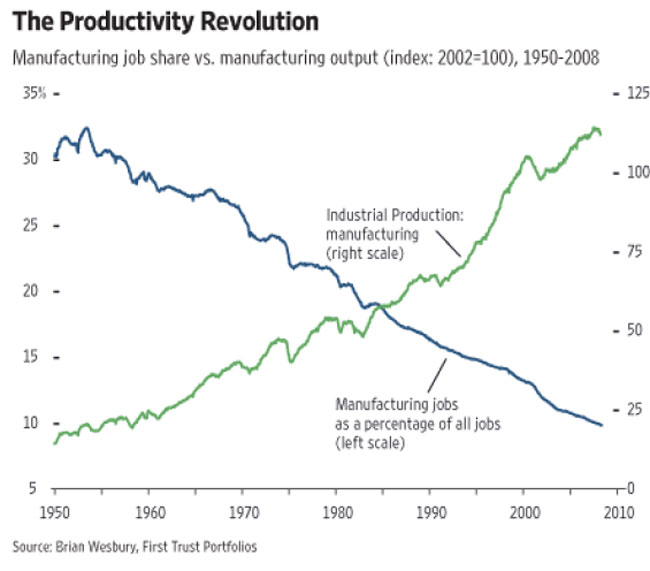General Discussion
Related: Editorials & Other Articles, Issue Forums, Alliance Forums, Region Forums"In the decade after World War II, the United States produced more goods than the rest of the world
combined. Now America’s share of world production is about 20 percent, which, depending on how you count, is about the same as China’s or slightly more.
Most of this change reflects other countries’ rise rather than any American decline. In fact, U.S. manufacturing output is about six times higher than it was in 1950; American workers are nearly 10 times more productive than those in China. Moreover, as any country develops—even factory-dense China, even a champion industrial exporter like Germany or Japan—the share of manufacturing in its economy steadily shrinks, as the service activities that mark a richer society, from health care to education to travel, grow more rapidly.
But there is a trend worth worrying about, which is the disappearance of manufacturing jobs from the workforce. Shortly after World War II, about one-quarter of employed Americans held manufacturing jobs. Now less than one-tenth do. From the perspective of individual businesses, this change is natural and desirable—rising productivity by definition means fewer people making more things. But it is troublesome for society as a whole, since factory jobs have historically buoyed the middle class and given rise to future industries and jobs, virtuous-cycle style.
Manufacturing may become strangely less international.
Despite all this—and despite everything we’ve heard through the decades about companies offshoring their factories in search of ever-cheaper pay—high-value manufacturing may increasingly be within each nation’s ability to control. McKinsey’s report divides manufacturing activities into five categories, including minimum-wage sweatshop work at one end and highly precise and mechanized aerospace or medical-tech production at the other. Of these, McKinsey forecasts, the categories that will grow fastest, and pay best, will largely be those whose producers and customers are located in the same country rather than separated by long ocean-freight journeys or expensive air trips.
*********more at the link**********
http://www.theatlantic.com/magazine/archive/2014/10/made-in-america-again/379343/?single_page=true
US manufacturing may have increased tremendously since 1950 but productivity has increased by much, much more resulting in far fewer manufacturing employees

The only way to make employment in manufacturing increase is for the rate of increase in manufacturing output to be more than the rate of increase on productivity. That does not seem to be happening in any developed country.
yeoman6987
(14,449 posts)Everyone banded together and worked harder than any other time in our history. Right now everyone is out for themselves and only themselves. Until we have a paradigm shift, we will continue to decline.
AngryAmish
(25,704 posts)That helped.
jberryhill
(62,444 posts)Let's bomb all the factories in China and India and see if that helps our share of world manufacturing. It's no mystery.
yeoman6987
(14,449 posts)Please read entire article before commenting. Thanks!
jberryhill
(62,444 posts)Quite obviously, having bombed the crap out of European industry set them back, and then we embarked on projects to rebuild them.
Malraiders
(444 posts)countries' manufacturing infrastructure had been ruined by war.
TreasonousBastard
(43,049 posts)Barring some horrific catastrophe, there is no way we'll ever be going back to the old days of the factory floor in most industries. Automation and robotics are the future, no matter how nostalgic we may be for the sweatshop.
So, rather than bemoaning the loss of buggy-whip makers, shouldn't we be thinking about just what to do with future generations of jobseekers? Tales abound of countries with much of an entire generation walking the streets idle looking at a dismal future with no decent employment.
That could be us some day. A day sooner than we think.
leftstreet
(36,108 posts)Fast food workers? Retail workers? All service and information labor...
Guess it's time to rethink what 'middle class' really means
yeoman6987
(14,449 posts)Until workers refuse to take those type of jobs, they will pay offered wage. Now if you want to make 25 dollars an hour doing almost anything. Move to North Dakota. That state is doing astonishingly well.
One_Life_To_Give
(6,036 posts)Look at your Daycare customers. The choice is between working for pay and staying home to take car of their child(children). If they are going to give up the later the former must be sufficiently valuable after deducting expenses to justify time away from family. At ten kids per daycare worker it could support higher wages. But at the current mandated numbers it's not going to happen unless you cater to Goldman Sachs employees.
librechik
(30,674 posts)We ought to be acting as if we were doing the same thing for some distressed country, i.e. the US!
damn the anti-social Congress!